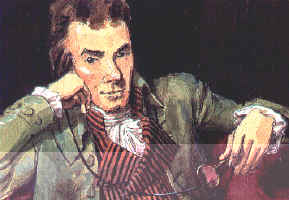
Mateo 5:13-15 \ Matthew 5:13-15
La Biblia de las Américas (LBLA)
Listen to this passage
13Vosotros sois la sal de la tierra; pero si la sal se ha vuelto insípida, ¿con qué se hará salada otra vez? Ya para nada sirve, sino para ser echada fuera y pisoteada por los hombres.
14Vosotros sois la luz del mundo. Una ciudad situada sobre un monte no se puede ocultar;
15ni se enciende una lámpara y se pone debajo de un almud, sino sobre el candelero, y alumbra a todos los que están en la casa.
Disciples and the World 13"You are the salt of the earth; but (A)if the salt has become tasteless, how can it be made salty again? It is no longer good for anything, except to be thrown out and trampled under foot by men.
14"You are (B)the light of the world. A city set on a hill cannot be hidden;
15(C)nor does anyone light a lamp and put it under a basket, but on the lampstand, and it gives light to all who are in the house.
14"You are (B)the light of the world. A city set on a hill cannot be hidden;
15(C)nor does anyone light a lamp and put it under a basket, but on the lampstand, and it gives light to all who are in the house.
Many people believe the abolition of slavery began in the United States during the American Civil War of the 1860s. In fact, the abolitionist movement began decades earlier in the British Empire under the unrelenting leadership of one man, William Wilberforce.
William Wilberforce was born in 1759 in the English city of Kingston-upon-Hull. He was educated at St. John’s College, Cambridge, and was elected as Hull’s Member of Parliament in 1780.
Wilberforce became a Christian in 1784. His salvation drove him to consider deeply his position in politics, even to the point that he considered leaving politics to become a minister. He eventually concluded that God had called him to public office to further causes that were in line with biblical truth. The most famous of these causes was his commitment to abolish slavery. Wilberforce’s salvation, therefore, had a profound influence on the history and way of life in the United Kingdom, the British Empire, and indirectly even the United States and its territories.
Stephens, H. L. “The Sale.” Color lithograph. Copyright 1863. Prints and Photographs Division, Library of Congress
This card by H.L. Stephens (1842–1882), an American illustrator of political satire, was part of a series of collecting cards depicting the plight of the slave.
The Society for the Abolition of the Slave Trade was founded in May 1787. Support for the movement was nationwide but was particularly strong in Northern England.
In 1788 one hundred petitions attacking the slave trade went before the House of Commons, and in 1792 that political body voted in favor of the principle of abolition, 230 votes to 85. However, upon seeing the extreme radicalism of the French Revolution, the Commons reversed the 1792 vote in 1793 hoping to avoid such a revolution in the British Empire.
Wilberforce and the other abolitionists were driven by their belief in the inerrancy of Scripture, acknowledging that God had made all nations of one blood (Acts 17:26) and that all men were created in the image of their Creator God (Genesis 1:26). John Wesley described slavery as “execrable villainy,” and said, “Unless God has raised you up for this very thing [abolition], you will be worn out by the opposition of men and devils. But if God be for you who can stand against you?”1
Wilberforce’s opponents included Lord Nelson, who later became the hero of the Battle of Trafalgar. Nelson wrote about the “damnable doctrine of Wilberforce and his hypocritical allies.”2 Wilberforce was known to be an abolitionist, but his strategy was first to end the slave trade. The Abolition of the Slave Trade Bill, which made the buying and selling of humans illegal throughout the British Empire and its colonies, became law on March 25, 1807.
Britain’s Parliament is where William Wilberforce struggled for man’s equality before God, and where he fought to abolish the slave trade in the British Empire.
Even with this success, Wilberforce was unfinished. He sought to see slavery completely abolished, believing that all people are descended from Adam and that none were less than human. At congresses in 1814 and 1815, held in Paris and Vienna respectively, Wilberforce tried, unsuccessfully, to persuade other European powers to follow the abolitionist route.
Shortly before his death, Wilberforce learned that the Reform Act of 1833 had passed. Within four years that Act would outlaw all forms of slavery in the UK and the West Indies.
If slavery had not been abolished in the early nineteenth century under the influence of such Christians who understood the Bible’s teaching on origins, what chance would there have been subsequently, as evolutionary thought took over in the mid-nineteenth century? Indeed, slavery has been retrospectively justified on the basis of the supposed lower order in the evolutionary process of certain “races.” We can thank God for men like Wilberforce and the eighteenth-century Evangelical Awakening that brought so many souls to faith in Christ. Christians today should learn from Wilberforce’s dedication to God’s Word that the truths of God’s Word, from the very first verse, should govern our standards. Wilberforce was guided by the truth that all men are descended from Adam, created in the image of God, and this truth continues to transform societies around the world.
William Wilberforce was born in 1759 in the English city of Kingston-upon-Hull. He was educated at St. John’s College, Cambridge, and was elected as Hull’s Member of Parliament in 1780.
Wilberforce became a Christian in 1784. His salvation drove him to consider deeply his position in politics, even to the point that he considered leaving politics to become a minister. He eventually concluded that God had called him to public office to further causes that were in line with biblical truth. The most famous of these causes was his commitment to abolish slavery. Wilberforce’s salvation, therefore, had a profound influence on the history and way of life in the United Kingdom, the British Empire, and indirectly even the United States and its territories.
Stephens, H. L. “The Sale.” Color lithograph. Copyright 1863. Prints and Photographs Division, Library of Congress
This card by H.L. Stephens (1842–1882), an American illustrator of political satire, was part of a series of collecting cards depicting the plight of the slave.
The Society for the Abolition of the Slave Trade was founded in May 1787. Support for the movement was nationwide but was particularly strong in Northern England.
In 1788 one hundred petitions attacking the slave trade went before the House of Commons, and in 1792 that political body voted in favor of the principle of abolition, 230 votes to 85. However, upon seeing the extreme radicalism of the French Revolution, the Commons reversed the 1792 vote in 1793 hoping to avoid such a revolution in the British Empire.
Wilberforce and the other abolitionists were driven by their belief in the inerrancy of Scripture, acknowledging that God had made all nations of one blood (Acts 17:26) and that all men were created in the image of their Creator God (Genesis 1:26). John Wesley described slavery as “execrable villainy,” and said, “Unless God has raised you up for this very thing [abolition], you will be worn out by the opposition of men and devils. But if God be for you who can stand against you?”1
Wilberforce’s opponents included Lord Nelson, who later became the hero of the Battle of Trafalgar. Nelson wrote about the “damnable doctrine of Wilberforce and his hypocritical allies.”2 Wilberforce was known to be an abolitionist, but his strategy was first to end the slave trade. The Abolition of the Slave Trade Bill, which made the buying and selling of humans illegal throughout the British Empire and its colonies, became law on March 25, 1807.
Britain’s Parliament is where William Wilberforce struggled for man’s equality before God, and where he fought to abolish the slave trade in the British Empire.
Even with this success, Wilberforce was unfinished. He sought to see slavery completely abolished, believing that all people are descended from Adam and that none were less than human. At congresses in 1814 and 1815, held in Paris and Vienna respectively, Wilberforce tried, unsuccessfully, to persuade other European powers to follow the abolitionist route.
Shortly before his death, Wilberforce learned that the Reform Act of 1833 had passed. Within four years that Act would outlaw all forms of slavery in the UK and the West Indies.
If slavery had not been abolished in the early nineteenth century under the influence of such Christians who understood the Bible’s teaching on origins, what chance would there have been subsequently, as evolutionary thought took over in the mid-nineteenth century? Indeed, slavery has been retrospectively justified on the basis of the supposed lower order in the evolutionary process of certain “races.” We can thank God for men like Wilberforce and the eighteenth-century Evangelical Awakening that brought so many souls to faith in Christ. Christians today should learn from Wilberforce’s dedication to God’s Word that the truths of God’s Word, from the very first verse, should govern our standards. Wilberforce was guided by the truth that all men are descended from Adam, created in the image of God, and this truth continues to transform societies around the world.
Muchas personas creen que la abolición de la esclavitud comenzó en los Estados Unidos de América durante la Guerra Civil de 1860. De hecho, el movimiento abolicionista se inició décadas atrás en el Imperio Británico bajo la implacable dirección de un hombre, William Wilberforce. William Wilberforce nació en 1759 en la ciudad inglesa de Kingston Upon Hull. Se educó en el St John's College, Cambridge, y fue elegido como Hull's miembro del Parlamento en 1780. Wilberforce se convirtió en un cristiano en 1784. Su salvación lo llevó a considerar profundamente su posición en la política, incluso hasta el punto de que él considera, dejando la política a convertirse en un ministro. Eventualmente llegó a la conclusión de que Dios le había pedido a los cargos públicos para promover causas que estaban en consonancia con la verdad bíblica. La más famosa de estas causas fue su compromiso de abolir la esclavitud. Wilberforce la salvación, por lo tanto, ha tenido una profunda influencia sobre la historia y forma de vida en el Reino Unido, el Imperio Británico, e indirectamente incluso de los Estados Unidos y sus territorios. Stephens, HL "La Venta." Litografía a color. Copyright 1863. Estampas y Fotografías División, Biblioteca del Congreso Esta tarjeta por HL Stephens (1842-1882), un ilustrador americano de sátira política, fue parte de una serie de recogida de las tarjetas que representan el sufrimiento de los esclavos. La Sociedad para la Supresión de la Trata de Esclavos se fundó en mayo de 1787. Apoyo a la circulación fue el país pero fue particularmente fuerte en el norte de Inglaterra. En 1788 cien peticiones atacar la trata de esclavos iba delante de la Cámara de los Comunes, y en 1792 ese organismo político ha votado a favor del principio de la abolición, 230 votos contra 85. Sin embargo, al ver la extrema radicalidad de la Revolución Francesa, la Commons invertido el 1792 votar en 1793 la esperanza de evitar este tipo de una revolución en el Imperio Británico. Wilberforce y el otro abolicionistas eran impulsados por su creencia en la inerrancia de la Escritura, que reconoce que Dios ha hecho todas las naciones de uno de sangre (Hechos 17:26) y que todos los hombres fueron creados a imagen de Dios, su Creador (Génesis 1:26 ). John Wesley describe la esclavitud como "execrables villainy", y dijo, "A menos que Dios le ha planteado para esta misma cosa [supresión], que se llevara a cabo por la oposición de los hombres y los demonios. Pero si Dios para usted que se puede estar en contra de usted? "1 Wilberforce oponentes incluyeron Lord Nelson, que más tarde se convirtió en el héroe de la Batalla de Trafalgar. Nelson escribió sobre la "damnable doctrina de Wilberforce y su hipócrita aliados." 2 Wilberforce era conocido por ser un abolicionista, pero por primera vez su estrategia para poner fin a la trata de esclavos. La abolición de la trata de esclavos Bill, que hizo la compra y venta ilegal de seres humanos en todo el Imperio Británico y sus colonias, se convirtió en ley el 25 de marzo de 1807. El Parlamento de Bretaña es donde William Wilberforce luchado por la igualdad del hombre ante Dios, y que luchó para abolir la trata de esclavos en el Imperio Británico. Incluso con este éxito, Wilberforce fue sin terminar. He tratado de ver totalmente abolida la esclavitud, en la creencia de que todas las personas que descienden de Adán y que ninguno fue menos que humanos. En los congresos de 1814 y 1815, celebrada en París y Viena, respectivamente, Wilberforce y trataron, sin éxito, persuadir a otras potencias europeas a seguir el camino abolicionistas. Poco antes de su muerte, Wilberforce se enteró de que la Ley de reforma de 1833 ha vencido. Dentro de los cuatro años que la ley prohíba todas las formas de esclavitud en el Reino Unido y en las Indias Occidentales. Si la esclavitud no ha sido abolida en el siglo XIX bajo la influencia de esos cristianos que comprende la enseñanza de la Biblia sobre los orígenes, ¿qué posibilidades que se han producido posteriormente, como pensamiento evolutivo se hizo cargo de mediados del siglo XIX? De hecho, la esclavitud ha sido justificadas retroactivamente sobre la base de la supuesta menor orden en el proceso evolutivo de determinadas "razas." Podemos dar gracias a Dios por los hombres como Wilberforce y el siglo XVIII Evangélica Awakening que trajo tantas almas a la fe en Cristo. Los cristianos de hoy debemos aprender de Wilberforce la dedicación a la Palabra de Dios que las verdades de la Palabra de Dios, desde el primer verso, debe regir nuestras normas. Wilberforce se guió por la verdad que todos los hombres descienden de Adán, creado a imagen de Dios, y esta verdad continúa para transformar las sociedades de todo el mundo.










No comments:
Post a Comment